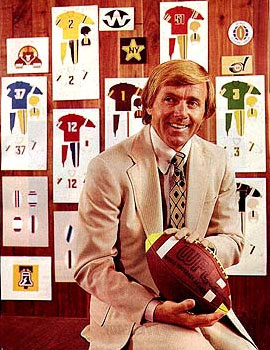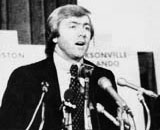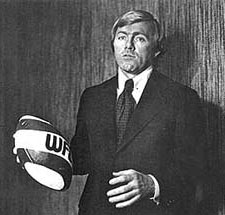


-
WFL

-
1974 Season

-
1975 Season

-
Multimedia


WFL Interviews
The World Football League Website presents an interview with World Football League founder Gary L. Davidson

Gary Davidson spoke with the WFL Hall of Fame one afternoon in August of 1999. From his home in California, he discussed the league's creation, its hopes of global expansion, the 1974 season and his personal highlights and memories. Gary was very gracious, and we'd like to thank him for his commitment to keeping the WFL alive. He currently looks after several business and real estate concerns.
HOF: When you decided to create the World Football League, what were you initial steps to get the league of the ground?
GD: The first decision we made in Vancouver with Ben Hatskin, who owned the Winnipeg Jets of the World Hockey Association. We were at a conference for the WHA, and I looked around and thought there were opportunities in football, and there were stadiums available in major markets and to have a league you need to place teams in New York, Chicago and Los Angeles to get a television contract and I thought we could do that. I also thought the timing was good 'cause the World Hockey Association was going well and I thought I could take the same staff and create the World Football League without the added cost. We had people who were interested in professional sports with basketball and hockey and we thought they might be interested in football. Any time you start a new league its financial credibility depends on who you get in early.
HOF: Ben Hatskin was the original owner of the Hawaii team.
GD: He dropped out right away, early. He didn't stay involved with the WFL.
HOF: Was your plan to get these investors in place and then market the franchises?
GD: We put together an organizational group that featured Nick Mileti, who owned the Cleveland Indians; Steve Arnold; Don Regan, my partner; John Basset, who had the team in Memphis, was one of the organizers. One of the interesting things in doing the American Basketball Association and the World Hockey Association was that we had press conference to announce the formation of the league and what happened during those press conferences was that we spent a majority of the time defending the concept of the league, it was always very negative. So when we created the World Football League we leaked the story to the Chicago Tribune and the Santa Ana Register, which is a paper in the Orange County area, and they had done some favors for me before, and I gave the story to the sports editor of the paper there. The story came out much bigger and much more positive than I ever imagined. My office was overwhelmed with phone calls. In fact, Tom Origer came out from Chicago with a $100,000 cashier's check for the Chicago franchise. The impact was good, and the WFL got off to a good start. We were innovative with the franchise names, the colors, the start of the league was a over-night success. It was the best thing I've ever done in business.
The economic timing was terrible. 1974 was a disastrous year in the world from a political side, the president resigned. Oil embargoes. The prime rate went to 15%. The Dow Jones dropped to 550. The real estate market had crashed and guys were filing bankruptcy left and right. It was a real hard time to trying to go out and raise venture capital.
HOF: The World Football League was one of the first "rogue" leagues to have a national television contract, which is an incredible accomplishment, how did that come about?
GD: Max Muhleman had sold all the advertising time for the broadcasts so we went to the networks and worked out the best deal we could with TVS and Eddie Einhorn.
HOF: With the ailing economy, was there ever a time that you discussed kicking off the WFL in 1975 or 1976?
GD: We got pushed into it a bit 'cause there was a financier in Alabama who was trying to start a league and we wanted to get a jump on him. There was Eli Broade, of Compton Broade, a very wealthy individual who told me, "Gary you're concept is good but your timing is terrible." He foresaw that '74 was going to be a tough year. If we had waited a year the WFL would have been more successful.
HOF: Did you feel the media and the mega-media machine of the NFL was making you (the WFL) out as "second class citizens?"
GD: That's standard for a new league. You sign a few good players, then a few more, and you get credibility. It's an evolution. You always call yourself major league when you start, and you pay major league salaries but it takes a while to gain credibility, but you don't get the credibility of the established league. Eventually you do, like a ABA or WHA.
HOF: What amount of a venture capital commitment did you want from the owners?
GD: The finances were much different in 1974. We told the owners that they needed $3 million to be successful. Many of the owners felt comfortable that they would commit to that, but when you lose your first million its harder to commit the other two million. Some were reluctant to do that. Of course, today you would need $300 million. After time there wasn't enough money to keep the league going.
HOF: Sports writers have suggested that the WFL may still be around today if the league had embarked on a 8-team, 12 or 14 game schedule. What do you think of that prediction?
GD: Some of the decisions we made in the WHA that were successful and we thought would carry over to the World Football League, didn't carry over well. We kept teams alive in the WHA, for instance the New York Raiders, and kept them going through the season. The WFL kept the Detroit Wheels alive when we should've closed them down, drafted their players and dropped their schedule. It had worked before so we thought it would be the best way to do it, when, in reality, if we had dropped a couple of teams the league would've survived.
In the World Hockey Association we tried "to carry the wounded out". We took money from the strong teams to keep the weaker ones alive, and that destroyed the WFL.
HOF: Early in the season the WFL was hit with the "Papergate" controversy. Isn't it common practice to offer discount or free tickets to promote a new league or product?
GD: The problem in Philadelphia was that they gave free tickets out and they lied about it. That was the first bad news we had. The Bell had a great opening day but they didn't tell the press that they papered the house. No one would've cared, they could've said, "we gave tickets away to the local high schools, the Salvation Army, the United Way, and youth programs-and we had 60,000 people" that would've been a great story. But they misrepresented that to the press and it killed our credibility.
HOF: What was your reaction to the news?
GD: I was upset. I have found historically that if I was up front with the press we got great coverage 'cause they are looking for stories. If I would say this is "off the record" it was fine, but to lie to somebody, or the press, and it gets magnified even worse.

Gary Davidson at the WFL press conference in 1973
HOF: What were some of the fondest memories that you had of the WFL?
GD: I think the opening game in Birmingham, Alabama, the Southern California Sun and the Americans. The stadium was packed, and as we looked out we felt we were on our way. We had a motorcade from the airport to Legion Field. Jacksonville had a great crowd for their opener against the New York Stars. The opening week was really exciting.

Gary Davidson displays one of the prototypes for the WFL football
HOF: What lead to the design of the WFL football?
GD: In my office, I have an original ABA basketball. And whenever you paint a ball like that it becomes very slippery, you don't have the tactical feel of the ball. We used to throw up the ball, wait for a time out and throw in a scuffed-up ball for the players. In the WHA we had a blue puck, 'cause we wanted something different, and the players complained that it didn't slide the same way cause of the carbon, which makes it black, added certain weight. When we designed the football we asked all the manufacturers, Spaulding, Rawlings, Wilson, to come up with some designs. I had a bag of footballs in my office that had balls that were long and skinny, so you could throw them a long way but they were harder to catch. And balls that were short and fat, so you could run well with them but couldn't throw as far. We had balls with laces on all sides so when the center snapped the ball you always had the laces right there in your hand. We tried every color, and had the quarterbacks try throwing them, and ended up with the golden ball with the orange stripes.
HOF: The World Football League pursued the prospect of a WFL franchise in Mexico City. What was the process of fielding a team there and how close did you come?
GD: I had gone down to Mexico City in August of 1974. In Mexico at that time if you wanted to be on the front page you simply bought space. Which is a flat bribe? We had a press conference, and all kinds of coverage, but the problem with moving into Mexico was that you had to price the house in the same proportion to the overall economy. If you had one millionaire and ninety-nine peasants, 1% of the house was priced to the millionaire and 99% to the peasants, you're ticket price would have been $0.25. The only way to survive would have been to buy out the government. With the name, World Football League, there was an interest to have teams outside of North America, Mexico City was a big market.
HOF: The WFL announced that it would pursue global expansion with franchises in Tele Viv, London, Tokyo and Frankfurt. That idea was far ahead of its time. In 1999, what is your reaction to NFL Europe?
GD: There's an entertainment dollar. Football is more marketable than soccer, there's more scoring. Taking football into a macho country like Spain is a very marketable proposal. The game is fast paced and there's a lot of movement.
HOF: Who were some of the owners that you felt were committed to making the WFL a success?
GD: John Basset. Tom Origer and I didn't get along but I thought he was on board. Chris Hemmeter in Hawaii had a strong investment group. The Hawaii market was just too small. Southern California had Larry Hatfield and I thought that was a strong group. Of course, Detroit was weak. In fact, the mayor of Detroit, Coleman Taylor, promised if I gave them a franchise we would be able to play in Briggs Stadium, that was an outright lie. The Wheels ended up playing out in the boonies. We had much stronger groups interested in the league than his. Some of those groups were in Detroit, and some were outside. We sent a guy out to the Wheels with a paycheck and the players roughed our man from the home office.
HOF: What were some other communities the WFL was pursuing?
GD: Louisville, Kentucky. Indianapolis. Mexico City.
HOF: In a recent article you were quoted as saying, "the day I resigned as the commissioner of the WFL was the worst day of my life", what were some of the events that led up to that event?
GD: It was a tough decision. People had said I was forced to resign but that wasn't the case, I had control of the board. I was so identified with the World Football League that maybe if I was out they could bring in new financing. And I was going through a divorce at the time, and I remember that I was lying down on my couch, in my office, and Max Muhleman came in and said, "Gary you're killing yourself why don't you take a break." The guy who took over the next year, Chris Hemmeter, Don Reagan helped him out a lot that year but he had some serious real estate problems in Hawaii and he couldn't devote the time to the WFL and they closed it down.
HOF: When you resigned as the commissioner of the WFL did you hold a minority interest in the league?
GD: No, I walked away. It was like a divorce. I had some business interests that I had to pay attention to.
HOF: How did you feel when the league folded?
GD: I felt bad, really bad. It was like losing a child. I really wanted the WFL to succeed. There's been so much water under the bridge that it's hard to remember just how I felt. Sports and entertainment is a rough business to be in.
NOTE: The Gary L. Davidson interview was conducted by Jim Cusano and Richie Franklin. This interview appeared on the former WFL Hall of Fame Website, and is used with permission. This interview is the property of the World Football League Website and may not be used without the permission of the Website owners.
© Copyright 1996-2007 Robert Phillips, All Rights Reserved